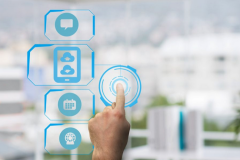Employers are liable to protect the privacy of their employees, whether it is related to their personal information or using online networks for work purposes. Usually, the prime concern of employers is to know how to protect employee privacy at work.
It is impossible to completely secure the employees` privacy, especially when using the internet to connect with clients and vendors. But you can take some necessary measures to protect them at the maximum level. Though some loopholes may be left, you should at least have a system to identify and deter unrestricted access to your employee data and information.
In this article, you will find the best ways to protect employee privacy at work.
Why Do Employees Need Privacy Protection at Workplace?
Every company collects the personal data of its employees, like their home address, phone numbers, family details, medical history, etc. This information is in addition to the academic qualification and the employees’ work history and is more vulnerable and sensitive. According to privacy protection laws, companies and employers are responsible for protecting all collected personal and sensitive data of their employees. And can be sued in case of mishandling this information.
Moreover, often employees use the internet for work purposes. Their devices and personal data are at risk due to malware and phishing activities. They need the protection of their personal information and must have secured options.
The need for the privacy of employees has turned multifold with the work-from-home working scenario. In addition, there is a significant increase in the hiring of a remote and virtual workforce, especially after COVID. And this calls for an increased need for the protection of the privacy of employees.
How to Protect Employee Privacy at Work?
Here are some ways through which employers can protect the privacy of their employees at the workplace:
- Transparent Privacy Policy
Every company must have a privacy policy that is applicable for all employees, whether remote or in-house. The privacy policy must clearly state which data of employees are collected and kept for records. It must mention the reason for collecting this data as well. Finally, the policy must contain all the information about storage, access, and use of this personal information.
The privacy policy should outline all the laws applicable for the privacy protection of employees and what measures the company will take in case of a data breach.
- Restricted Access to Employees Personal Data
Keeping a record of employees` personal data is crucial for companies due to different reasons. They are liable to protect this data by all measures. And for this reason, only restricted people must have access to the employees` information. It is essential to ensure that the data is safe and will not be used for unauthorized purposes. It is illegal to use the data of the employees for any personal or commercial use without the permission of the employees.
- Protected Devices
Apart from personal data in the company’s record, some other data of the employees are also at risk while they are at the workplace. Their data may be stolen directly from their devices through malware and phishing activities. Here again, the employer is liable to provide protected devices to its employees. Each device used at the workplace must be equipped with a firewall and updated antivirus and antimalware software.
This implies to all devices used by the employees for work purposes. Whether they are owned by the company or belong to the employees. Protected devices are not essential for securing the data of the employees only. They are also crucial for the protection of the database of the company.
- Secured Access
It is recommended to opt for secured access to the database of the company for privacy protection. The company must assign a workplace identity to each employee that makes them anonymous on the network. The employees have to access the system with the company’s username. This would help in protecting their identity and data.
Using two-factor authentications is also a good idea for protecting the privacy of the employees. For example, this ensures that no one gets access to an employee’s workspace without his permission.
- VPN
Virtual Private Network (VPN) is a proven way of securing your network. It encrypts all the incoming and outgoing information to the system, making it impossible to access by anyone. It is essential for protecting the personal data of the employees and keeps them secure.
Moreover, VPN also disguises the identity and location of the users by allowing them to connect from an anonymous id and remote portal. Therefore, VPN is particularly essential for all the remote employees accessing the company’s system from different locations.
- Private Wi-Fi
All enterprises and companies, regardless of their size, need to have their secured private Wi-Fi. It is crucial for the protection of all personal and organizational data.
Unprotected and easily exposed Wi-Fi is an open invitation to all cybercriminals to attack the database and access sensitive information. Therefore companies must opt for their secured private Wi-Fi. This secures the data of their employees and helps monitor all tasks carried out via the internet. It also decreases the attacks on the system through malware and phishing activities.
- Limited Internet Usage
Employees at the workplace must be allowed limited access to the internet. This is for their protection as well as for the protection of the company. For example, many websites install cookies and get access to the system without asking for consent. Similarly, some websites collect your location and other system information for commercial use. Access to all such sites must be prohibited through a workplace network.
Moreover, social media sites are a great way to leak personal information. They are also time killers and keep employees busy in unproductive activities during working hours. Therefore employees must be allowed limited usage of the internet at the workplace.
Conclusion
Every employer is liable for the protection of its employee privacy. For that, he must make sure to collect only the required information. And protects it with restricted access. In addition, he should provide secured devices and networks to his employees to ensure their privacy.
Image Credit: provided by author; pexels; thank you!

















